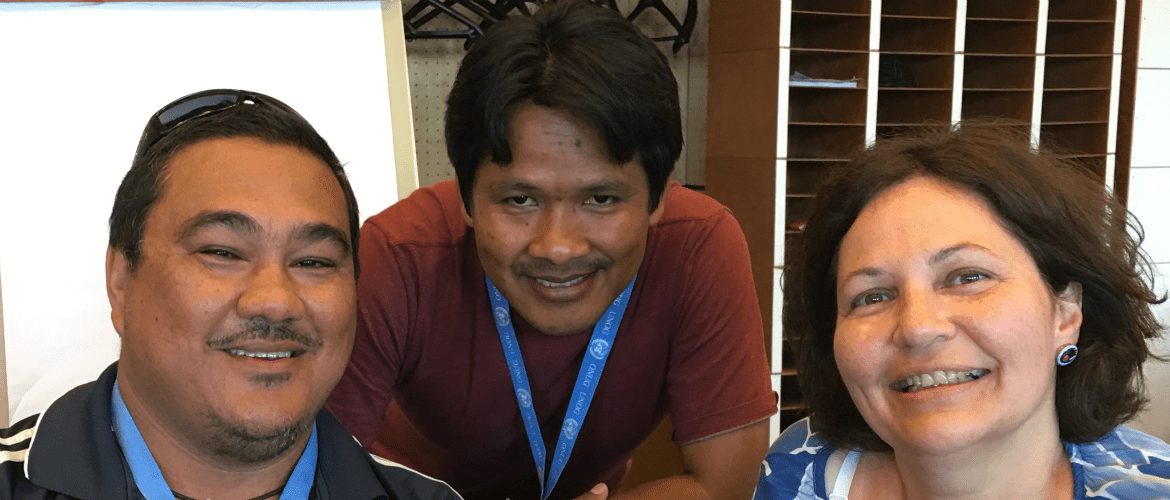
By Eddie Cubillo, Oxfam Aboriginal and Torres Strait Islander Reference Group member
Eddie Cubillo is the 2015 National Indigenous Legal Professional of the year and in Geneva on a UN Indigenous fellowship to help bring positive change in his community — a commitment he hopes the federal government will adopt after the election.
My name is Eddie Cubillo. I’m an Aboriginal man of Larrakia/Wadjigan and Central Arrente decent with strong family links to both the urban and rural areas of the Northern Territory.
My family has experienced firsthand the intergenerational effects of the policy of forced removal of children of mixed descent from their family and country.
Right now, I’m in Geneva at a forum hosted by the Office of the United Nations High Commissioner for Human Rights (OHCHR). I’m with fellow Indigenous people from around the world learning about international human rights instruments and mechanisms, and how we can use them to advocate for the rights of our communities.
It’s a great privilege and opportunity to be here. Every day I’m immersed in learning and discussing issues that impact on Indigenous people. It’s informative and I’m passionate about supporting my own people and working with other Indigenous people.
But I also have an eye back home on Australia watching the current election campaign unfold in which issues facing my people have been largely absent, particularly from the current Government.
As someone with more than 20 years working at the grass roots level of Aboriginal affairs as a lawyer in the Northern Territory (NT), the former NT Anti-Discrimination Commissioner and recently as an Executive Officer with the National Aboriginal & Torres Strait Islander Legal Services (NASTILS), I can tell you that for our people, the relationship with the Federal Government has been strained for many years.
The state of Indigenous affairs hasn’t improved to the point where it can challenge the devastating statistics for Aboriginal people across health equality, incarceration levels, disabilities, access to education and homelessness — just to name a few.
Despite this, there have been significant cuts in the past two budgets affecting Indigenous health and legal aid services which directly impacts the lives of Aboriginal and Torres Strait Islander People.
As a nation, we haven’t planned to tackle the shameful rates of Indigenous incarceration — an area I’ve worked in for most of my professional life.
Last Friday I and other delegates, who come from English, Spanish, French and Russian language groups from around the world, undertook practical assignments and exercises to better integrate the theory of human rights. The wealth of knowledge and experience in advocacy as well as the cultural and spiritual knowledge in the room was inspiring for me.
On the same day many of my Indigenous colleagues and peers met in Sydney to prepare for the next Australian Government. Sadly, it’s not an inspiring time for Indigenous people in this country. But as Aboriginal and Torres Strait Islander Peoples we remain determined to bring change.
I hope that change is on the horizon for Indigenous Australians which includes respect for our beliefs and values; a respect that acknowledges Aboriginal and Torres Strait Islander People can make significant contributions to drive real, long-lasting change in our communities.
Maybe this election can be the spark for real change: beginning with the government’s engagement with Indigenous peoples.
Bringing about positive change is the whole reason why I’m at the UN. Understanding the work of the United Nations and other international agencies is important to bring First Peoples issues into the international arena. It’s organisations like Oxfam and Queensland Aboriginal Islander Health Council where I work that are helping to bring about change at home.
When you vote on Saturday to elect our next Federal Government, I urge you to consider what impact your decision will have on justice for Aboriginal and Torres Strait Islander Australians.
Eddie has been a member of Oxfam’s Aboriginal and Torres Strait Islander Reference group since 2007 and is the 2015 National Indigenous Legal Professional of the year. He currently works for Queensland Aboriginal Islander Health Council (QAIHC).